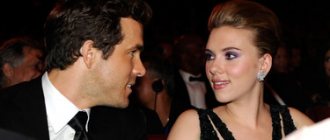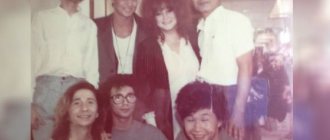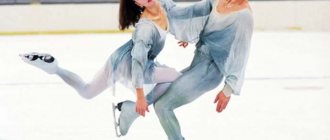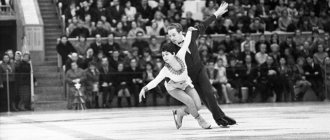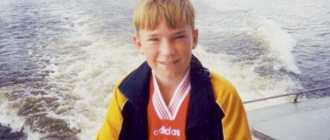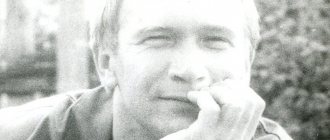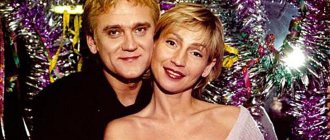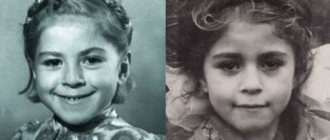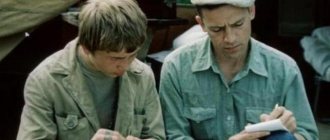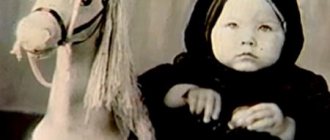Views: 437
Alexander Kaidanovsky is a talented Soviet actor, director and teacher with a bright, eventful biography. His theatrical career did not work out, but he achieved fame in cinema. Kaidanovsky’s difficult character was the cause of many conflicts, and his bohemian lifestyle led to three divorces and interrupted his earthly journey at the age of 49.
Alexander Kaidanovsky. Photo belcanto.ru
Alexander was born on July 23, 1946 in Rostov-on-Don. His father (by birth Leiba Leibovich Kaidanovsky, who later changed his name to Leonid Lvovich ) held a high position in the management of the Rostov Gaznefteprovod, and his mother, Vera Aleksandrovna Onishchuk , was a stage director in a children's theater studio. The parents' marriage did not last long, and after their divorce the boy remained to live with his father.
Sasha Kaidanovsky as a child with his parents. Photo: smutokilon.ru
Having inherited creative genes from his mother, Sasha dreamed of becoming an actor since childhood, but his father wanted him to get a reliable specialty. When the young man graduated from 8th grade, Leonid Lvovich sent him to Dnepropetrovsk to his sister, where Sasha went to a technical school to study to become a welder.
After studying there for one year, Kaidanovsky, secretly from his father, left the technical school and entered the acting department of the Rostov School of Arts . Leonid Lvovich forgave his son only after he saw him in the fourth year in the play “Young Guard” - he recognized Sasha’s talent and his right to choose his own path in life.
Having completed his studies in 1965, Alexander went to Moscow and on the first try successfully passed the exams at the studio school at the Moscow Art Theater. But a month later he left there - he did not like the “mentoring and stupid ceremonial rituals” that, in his opinion, flourished at this university. Kaidanovsky moved to the Shchukin Theater School in the workshop of Boris Zakhava , from which he graduated in 1969. Among his classmates were Leonid Filatov (whom Alexander considered the most talented on the course), Ivan Dykhovichny, Nina Ruslanova , Boris Galkin, with whom he became especially friendly during his student years.
Childhood
Alexander was born on July 23, 1946 in the city of Rostov-on-Don. His father, Leonid Lvovich, had nothing to do with art. He served as a pilot on the fronts of the Great Patriotic War, where he was wounded. After the war, Leonid Lvovich got a job at the Rostov MGB as head of a radar station. In 1945, his wedding took place with Vera Alexandrovna Onishchuk. The girl was well versed in literature and music, had a keen ear and a beautiful voice. Thanks to their wide, charming smile, he and Leonid looked alike. At first this marriage was very happy.
Not far from the family’s house there was a university library building destroyed during the war. In the ruins one could find a wide variety of books. It was then that little Alexander developed a passion for reading, which accompanied him throughout his life.
In the late 40s, Leonid Lvovich was fired under the so-called “fifth point”. Then the young man entered a local technical school and received an education as an underwater welding specialist. Throughout his subsequent life, he worked in his specialty in the construction of all kinds of hydraulic structures.
Vera Alexandrovna first worked as a librarian, but as a student at the Institute of Culture, she became interested in theater and decided to try herself as a theater director. In the children's plays, which the girl soon began to stage, there was no place for her own son. She considered Sasha unartistic. Perhaps it was the hidden resentment towards his mother that would later lead to Alexander choosing the acting path.
Gradually, the relationship between Leonid and Vera began to become complicated because the man was very jealous. He could not stand it when young artists, many of whom were very interesting, revolved around his wife. Ultimately, in 1960 the family union was dissolved. Soon Vera Alexandrovna married a second time. Sasha stayed to live with his father.
Biography
Memorial plaque in Rostov-on-Don
Alexander Kaidanovsky was born on July 23, 1946 in Rostov-on-Don.
In 1960-1961 he studied at the Dnepropetrovsk Welding College named after E. O. Paton[4].
In 1965 he graduated from the Rostov Theater School (course of M. I. Bushnov). He entered the Moscow Art Theater School, but after studying for several months, he left there.
In 1969 he graduated from the Theater School. B. Shchukina.
In 1969-1971 he worked at the E. B. Vakhtangov Theater. The actor himself recalled: “The Vakhtangov “corporation” poisoned my love for theatrical life: internal relationships in the theater are always built on some disgusting principles, on the fact that some have to humiliate others. I am essentially a free person; I would not like to humiliate anyone or be humiliated. That's why I left the theater. How? What does an actor do when he is not allowed to act? He drinks. And a couple of times I drank so thoroughly that they rushed to get rid of me.”[5]
Then he worked at the Moscow Art Theater and the Theater on Malaya Bronnaya. Since 1973 - military service (cavalry regiment at Mosfilm).
In 1982, Kaidanovsky entered the Higher Courses for Scriptwriters and Directors in the workshop of Andrei Tarkovsky, which the director opened almost especially for him[6]. However, Tarkovsky soon emigrated to Italy, so Kaidanovsky completed his studies with Sergei Solovyov. Graduated from the course in 1984.
Already in Italy, Tarkovsky wanted to see Kaidanovsky in the title role in Nostalgia, which was filmed in Italy, but he was not released from the USSR[7].
In 1989, Kaidanovsky taught directing at the B.V. Shchukin Theater School.
In 1992, Alexander Kaidanovsky was awarded the honorary title “Honored Artist of the Russian Federation”[3].
1994 - member of the jury at the Cannes Film Festival.
In 1995, he led a screenwriting workshop at VKSR.
| External images | |
Alexander Kaidanovsky died on the morning of December 3, 1995 from a third heart attack in his room in a communal apartment[8].
He was buried at the Kuntsevo cemetery in Moscow, section 10.
Education
Wanting to find freedom, Sasha went to Dnepropetrovsk and entered a welding college there. He didn't care where to study, as long as he got rid of family dramas. The father was very glad that his son followed in his footsteps. However, Alexander Kaidanovsky stayed at the technical school for only a year. Despite his father's indignation, the future actor entered the Rostov Theater School.
The guy took his studies with extreme seriousness. He spent hours listening to art reading records and working on his diction. He was very fascinated by the way great poets read their poems. In the early 60s, Alexander began to communicate a lot with the Rostov artists Charsky. He grew up quickly and became more and more demanding both of himself and of those around him. Having quickly outstripped his fellow students in intellectual development, Alexander Kaidanovsky stopped seeing the point in learning. The thesis director refused him, so the guy had to look for a replacement. Having got a job in the Rostov theater after college, the young actor quickly left because of a conflict with the director.
Moscow
After his dismissal from the tetra, Kaidanovsky Alexander set off to conquer the capital. Here he applied simultaneously to four theater schools, three of which accepted him thanks to a successfully completed creative assignment. Alexander preferred the Moscow Art Theater School, but he did not stay there for more than a month. According to the actor, he constantly felt under supervision there. After he wandered around idle for about a month, the young actor was lucky - the rector of the Shchukin School took him to study for an already completed course.
In March 1966, Alexander Kaidanovsky got married. His wife was Irina Bychkova, with whom they had been friends since their studies at the Rostov school. She moved to her husband in Moscow, where they lived in rented rooms for a long time.
Literature
- Fedor Razzakov.
Star tragedies: mysteries, fates and deaths. - M.: Eksmo, 2000. - 400 p. — ISBN 5-04-004335-X. — ISBN 5-04-004333-3. - Sergei Medvedev.
Alexander Kaidanovsky. Diagnosis: genius // Who's in charge: magazine. - Rostov-on-Don, 2007. - No. 10. - Irina Zaichik.
One among strangers // Ogonyok: magazine. - M., 1998. - July 12 (No. 27). — P. 16. - Alexander Kaidanovsky. In memories and photographs / Comp. E. V. Tsymbal. - M.: Art, 2002. - 264 p. — ISBN 5-85200-141-4.
Carier start
In 1967, Alexander received an invitation to play the role of Hamlet at the Aksenova-Ardi Experimental Theater. The role was played brilliantly. Kaidanovsky interpreted the image of Hamlet in his own way, for which he ran into wariness from critics. However, the latter could not resist the talent, intelligence and toughness of the actor. Since then, Alexander Kaidanovsky has become noticeable and began to receive invitations to film roles. The actor auditioned for several roles, but they constantly refused to approve him. The directors unanimously complained that Alexander did not fit into the usual role of a positive hero.
First roles
At the age of 21, the actor starred in his first episode. The painting was called “The Mysterious Wall.” Then he got a small role in the film Anna Karenina. Mysteriously, the first roles, which, one way or another, were associated with mysticism, left their mark on Alexander’s entire subsequent career. In the film “The Noble Nest,” directed by Mikhalkov and Konchalovsky, the actor played in the episode “Singers.” This episode was ultimately not included in the film, but it was it that allowed Andrei Tarkovsky to consider Alexander’s talent. However, the cooperation of men will take place later.
After completing his studies, Alexander Kaidanovsky was invited to work at the theater. Vakhtangov. Around the same time, as a result of an unsuccessful operation, his father Leonid Lvovich died quite unexpectedly.
While still studying, Kaidanovsky tried to write and even stage theatrical compositions based on Pushkin and Bulgakov. Thanks to his special style of thinking, he had all the makings of a director.
Memory
In 1998, director E. V. Tsymbal made a documentary film “Stalker’s Dreams” about the work of Alexander Kaidanovsky.
The developers of the game “STALKER Clear Sky” paid tribute to the actor, using the appearance of Alexander Kaidanovsky, who played the main role in A. Tarkovsky’s film “Stalker,” as a prototype for the game’s protagonist[9].
From the memories of contemporaries
We were friends with him. Although it was a difficult friendship, and he was a difficult person, I admired him and looked up to him. Kaidanovsky was an incredible man - he could masterfully swear, chat in gangster jargon, and could talk to you all night about literature, about things that not a single specialist here knew... There was something inexplicable in his fearlessness: once, in his fourth year Shchukinsky, the five of us - he, Galkin, Kachan, Matveev and I - were returning at night through Maryina Roshcha. Not far from Rizhskaya, six people accosted us, they had knives... In principle, the five of us could have waved them off, but against knives, I don’t know how it would have turned out. Kaidanovsky approached the one who first took out the knife and grabbed the blade with his bare hand. I just took it. Blood gushes, but he holds on. And there was something in his face that made them give up...
— Leonid Filatov.
To be remembered, Chapter 29. Alexander Kaidanovsky, 1996
Career blossoming
In 1970, the two-part film “Drama on the Hunt” was released. For Kaidanovsky, it became his first serious work on television. In the same year, the actor became a father. His daughter Daria was born. Alexander was incredibly happy about the appearance of his daughter, but cinema was becoming more and more important in his life. Pictures with the actor’s participation began to come out one after another.
In those days, Alexander Kaidanovsky began an affair with Valentina Malyavina, the most fatal lady of the then theatrical beau monde. The actor completely lost his head from this unexpected love. He refused roles and changed theaters one after another. And after that, the man completely decided that an acting career was not for him. He soon divorced his wife, and a little later broke off his ill-fated affair with his mistress.
Army
The unemployed actor was drafted into the army. He ended up in a cavalry regiment and became a good rider, thanks to physical strength, good coordination and agility. Later, the skills acquired in the army helped the actor cope with stunts on set without the help of stunt doubles. In the film “A Friend Among Strangers, a Stranger Among Our Own,” Kaidanovsky Alexander ran on the roof of a train rushing at full speed. He then climbed down the ropes and, breaking the window, jumped onto the train. He was often called to play foreigners, including true aristocrats. In addition to his role in the mentioned film by Nikita Mikhalkov, this period of the actor’s life was also remembered for his role in the film “The Player” by Alexei Batalov.
According to Mikhalkov, Alexander knew how to “play virtuoso melodies on one string.” He knew how to focus and concentrate his entire rich inner world. Mikhalkov's film brought the actor all-Union popularity. His character was a noble aristocrat, with subtlety of reactions and composure. Later, the actor played the role of Count Vorontsov in the film “A Diamond for the Dictatorship of the Proletariat,” which also caused a sensation.
Filmography
Acting works
- 1967 - The Mysterious Wall (dir. I. I. Povolotskaya, M. N. Sadkovich) - Someone
- 1967 - Anna Karenina (dir. A. G. Zarkhi) - Jules Lando
- 1968 - First love (dir. V. S. Ordynsky) - Maidanov
- 1969 - The Noble Nest (the episode with Kaidanovsky’s participation was not included in the film)
- 1970 - Drama on the hunt (dir. B. E. Nirenburg) - Count Alexey Karneev
- 1970 - Red Square (dir. V. S. Ordynsky) - soldier
- 1970 - A calm day at the end of the war (short film, directed by N. S. Mikhalkov) - sergeant
- 1971 - And there was evening, and there was morning (dir. A. A. Saltykov)
- 1971 - The Hound of the Baskervilles (dir. A. Zinoviev) - Jack Stapleton
- 1972 - Fifteenth Spring (dir. I. S. Tumanyan) - liaison
- 1972 - Player (dir. A. V. Batalov) - Astley
- 1972 - Fourth (dir. A. B. Stolper) - Second
- 1972 - The investigation is being conducted by experts 6. Blackmail - Mirkin
- 1972 - The Mathematician and the Devil (short story from the almanac "Horizon", issue 2, directed by S. Raitburt) - The Devil
- 1973 - Children of Vanyushin (dir. E. I. Tashkov) - Konstantin
- 1973 - The collapse of engineer Garin (dir. L. A. Kvinikhidze) - Dr. Wolf
- 1973 - Past and Thoughts (dir. L. Elagin) - critic Vissarion Belinsky
- 1974 - One among strangers, a stranger among one's own - Captain Lemke
- 1974 - Following my course (dir. V. G. Lysenko) - Misha
- 1974 - When the wrath of fate befell me... (short film, directed by V.V. Brovkin)
- 1975 - The Lost Expedition (dir. V.D. Dorman) - officer Zimin
- 1975 - My home is a theater (dir. B. V. Ermolaev) - A. N. Ostrovsky
- 1975 - Under the roofs of Montmartre (dir. V. M. Gorikker) - Raoul
- 1975 - Diamonds for the dictatorship of the proletariat (dir. G. E. Kromanov) - Vorontsov
- 1976 - Bridge of Fire - Gennady Dubravin, lieutenant (dir. B. Nirenburg)
- 1976 - Golden River (dir. V.D. Dorman) - Zimin
- 1976 - How important it is to be serious (dir. A. A. Belinsky)
- 1976 - My business (dir. L. G. Maryagin)
- 1977 - Who will go to Truskavets (dir. V. Akhadov)
- 1977 - It was in Kokand (dir. U. E. Nazarov) - Zaichenko
- 1978 - The Life of Beethoven (dir. B. D. Galanter) - Anton Schindler, Beethoven's secretary
- 1978 - Turn (dir. V. Yu. Abdrashitov)
- 1979 - Inquest of Pilot Pirx - neurologist and cyberneticist Tom Novak
- 1979 - Bodyguard (dir. A. Khamraev) - Mirzo
- 1979 - Stalker (dir. A. A. Tarkovsky) - Stalker
- 1980 - The Story of an Unknown Man (dir. V. Žalakyavičius) - Vladimir
- 1980 - Rafferty (dir. S. Aranovich) - Prosecutor Ames
- 1980 - Rescuer (dir. S. A. Solovyov) - Nikolai Varaksin, documentary director (voiced by A. Romashin[16])
- 1980 - Fact (dir. Almantas Grykevicius) - Stanislav
- 1981 - And I’m with you again (dir. B. Galanter) - reads poetry on behalf of the Decembrist N.V. Putyata
- 1982 - Excuse me, please (dir. V. P. Zhalakyavichyus) - Pranas
- 1982 - Department - Orlov
- 1982 - Brothers (film)
- 1987 - Ten Little Indians (dir. S. S. Govorukhin) - Philip Lombard
- 1987 - Khareba and Gogi (dir. G. N. Shengelaya) - Prince Olshevsky
- 1988 - New adventures of the Yankees at the court of King Arthur - Lancelot
- 1992 - November (Poland-France) (dir. L. Karwowski)
- 1992 - The Devil's Breath (Spain) (dir. Paco Lucio)
- 1994 - Magic Hunter (Magic Shooter), (Hungary) (dir. I. Enyedi)
- 1995 - Revelations to a Stranger (France-Russia) (dir. J. Bardawil) - Kryuchkov
- 1995 - Wedding March (short story from the film anthology “The Arrival of a Train”) (dir. A.F. Hwang)
Cartoon dubbing jobs
- 1977 - Forward, time! (dir. V.I. Tarasov) (reads the text)
- 1980 - Return (dir. V. Tarasov) (uncredited)
- 1985 - Contract (dir. V. Tarasov)
- 1985 - Two tickets to India (dir. R. A. Kachanov)
- 1988 - Pass (dir. V. Tarasov)
- 1992 - The Dream of a Funny Man (dir. A.K. Petrov)
Film scoring
- 1982 - Condor / Dögkeselyű (Hungary, directed by F. András)
- 1984 - An incredible bet, or a true incident that ended successfully a hundred years ago - law student (role of B. G. Plotnikov)
- 1985 - Simple Death - Ivan Ilyich (role of V. M. Priyomykhov)
- 1988 - Kerosene man's wife - Vasily Petrovich (role of N. Ispolatov)
Director's work in cinema
- 1983 - Jonah, or the artist at work - director. Course work created at the end of the 3rd year of S. A. Solovyov’s workshop, based on the story of the same name by A. Camus, script written jointly with G. I. Rerberg
- 1983 - The Garden (based on the story by H. L. Borges “The Garden of Forking Paths”)
- 1985 - Simple Death... - director, screenwriter. Thesis based on L. N. Tolstoy’s story “The Death of Ivan Ilyich”
- 1987 — Guest — director, screenwriter (based on the story by H. L. Borges “The Gospel of Mark”)
- 1988 - Kerosene Man's Wife - production director, screenwriter
- 1989 - Maestro: Sergei Parajanov - director, screenwriter
- 1989 - For A Million - director, screenwriter (video clip for the German group Alphaville)
- 1992 - Bronze Christ - artistic director
- 1992 - Everything ends, only love - never - artistic director
- 1993 - Defloration - artistic director
- 1995 - Garson No. 2 - director, screenwriter (video clip for B.B. Grebenshchikov and the Aquarium group)[17]
Second marriage and role in “Stalker”
Soon the actor got tired of constantly playing lieutenants. Within the framework of the cinema of that time, he was cramped. He took on only those roles that carried an in-depth, sometimes ruthless analysis of personality. The man began to think about directing, but fate decreed otherwise.
At this time, Alexander Kaidanovsky, whose personal life faded into the background, met the young actress Evgenia Simonova. She was just as pedantic and hated approximation and generalization. Soon the mutual interest of the actors grew into love. In 1975 they got married. For the next two years they tried to act together. On November 5, 1976, the couple had a daughter, Zoya. Around the same time, Andrei Tarkovsky invited Alexander to the main role in the film “Stalker”.
All his life the actor had been heading towards just such a role. As a result, he completed his task brilliantly. Tarkovsky was able to see in Kaidanovsky what he carefully hid: vulnerability, insecurity and psychological trauma. Most likely, this is why the actor does not like to review this picture.
After his role in Stalker, the actor took up films only in two cases - when the film touched a nerve or when there was a catastrophic lack of money. Alexander Kaidanovsky was such a unique actor. The man's personal life soon began to collapse. After eight years of marriage, he divorced Evgenia Simonova.
Thanks to his role in Tarkovsky’s film, the actor began to be recognized abroad and invited to film festivals. However, the actor’s only trip outside the USSR was to Poland, after which the KGB forbade Alexander to leave the state. The actor was not even given invitations from abroad, considering it unnecessary. When he was cast in Tarkovsky's new film Nostalgia, he was not allowed to fly to Italy. After this, Alexander Kaidanovsky, whose biography is full of spontaneous decisions, decided to leave his acting career once and for all.
Alexander Kaidanovsky. He was a difficult man
He was a magical personality, marked with the sign of disaster from birth.
The epithets “mysterious”, “complicated”, “inexplicable” suit him like no other. Kaidanovsky is the most controversial actor in Russian cinema. It’s amazing how one and the same person could accommodate an esthete-philosopher, a fascinating complexity of spiritual impulses and... an ordinary rowdy drunkard.
In the spirit of Dostoevsky
Alexander Kaidanovsky was born in 1946 in Rostov-on-Don. After school, he entered the Dnepropetrovsk Welding College, but soon left there a year later and was admitted to the Rostov School of Arts.
In 1965, Sasha arrived in Moscow, where he surprisingly easily entered the most “criminal” Moscow Art Theater School in the country and... became the only one who, without studying for even a month, left it on his own! "I can not. Portraits of Stanislavsky and Nemirovich-Danchenko are looked at with such reproach that you can’t breathe...” He moved to the Shchukin Theater School. But here he found it boring. “I’m dying of boredom,” - almost every day I rushed from the Moscow River to the quiet Don, to my beloved girl Irina. In 1966 they got married, and Irina moved to Moscow with her husband. Kaidanovsky's film debut took place in his second year of college - in the film “The Mysterious Wall” (1967) he played a cameo role as a young researcher.
Alexander liked metropolitan life: reading poetry and drinking wine all night long. The young provincial was jealous of the pedigree of his major friends. It was only later that he became an esthete, a cynic and a favorite of women, and then!.. In one shoe instead of a lace there is a dirty bandage, in the other there is muslin from a curtain, secretly cut off at a party. He and his wife lived in the former janitor's room: below ground level, a tiny kitchen with a slanted ceiling, which was formed by a staircase, and in the part where the staircase rested on the floor, there was something like a closet. In the room there was a stroller with a child and an old heater.
The future celebrity opened the closet and showed it to the guests - the floor was rotten, there was a smell of burial dampness, there was water below. He proudly called his home “an apartment in the spirit of Dostoevsky.” The door to the house was constantly open for friends. At night, as a rule, they did not sleep, but sang with a guitar and argued about literature. Having discovered in the morning that there was not enough booze, they left to get more. Sometimes Alexander returned only a day later and, without explaining anything, fell asleep. Irina endured it; it seemed to her that her husband needed the company of such “interesting and educated people.” And my husband left all his fees in the restaurants.
During these years, Kaidanovsky received a criminal record. The incident occurred in a restaurant: Alexander needed to freshen up, but apparently he wandered into the wrong place. As a result, I ended up in the boiler room; Without really thinking anything through, he hit someone for something. And the man turned out to be a war veteran... There was a trial. Article 205, “hooliganism”. At that time they could give it to the fullest. But Mikhail Ulyanov came to the trial, said a few words, and Kaidanovsky was given two years probation.
In those days, no one believed in Kaidanovsky as an actor. Mikhail Ulyanov even advised him to return back to Rostov and get a job at the local theater there. But the young actor did his own thing - in 1973 he joined the army. The place of service was the cavalry regiment at Mosfilm. It was then that he played his first starring role - Lieutenant Lemke in Nikita Mikhalkov’s film “A Friend Among Strangers, a Stranger Among Our Own.”
After the film was released, Kaidanovsky “woke up as a star.” The country, tired of the correct Soviet characters, fell in love with his hero at first sight. From such a resounding success, the “roof” simply could not help but move. Arriving at the restaurant, he sat at a table - with terrible stubble, drunk, but in a dazzling white suit and read aloud the poems of Arseny Tarkovsky... When they reprimanded him, he rushed into a fight. They began to recognize him, he began to develop passions. At first there were few of them, and Alexander told his wife about them. But gradually, meeting Irina and her daughter after their next return from Rostov, each time he was less and less happy about them. At that time, the beautiful actress Valentina Malyavina appeared in their house as a bosom friend of the family.
Colleagues and friends treated her differently, but they all agreed on one thing: Valya was very pretty. The princess from “The Deer King”, the nurse Masha from “Ivan’s Childhood”... Her eyes were striking - two deep blue pools.
She showered his wife Irina with compliments, saying: “How happy you are! How can I help you? Should I go get some milk?..” It ended up that one day, when they didn’t want to open the door for her, she simply... climbed in through the window! Irina, unable to bear the vicissitudes of the love triangle, filed for divorce and left with her daughter for Rostov. After which Kaidanovsky himself did not let Malyavina out of his apartment, locking the door with a key. So one winter she went out onto the balcony and climbed over the adjacent railing. Alexander looked for her on the ground, having fallen to her death; and at that time she was drinking wine in the warm neighboring company. Valya was worried that she was five years older than him. And Sasha was perplexed: “You fool, what difference does it make if I want you?!” When she opened her veins, he laughed and didn’t believe it; Afterwards, when the whole room was already covered in blood, I took him to the hospital. The affair lasted 6 years and ended in nothing. “I would no longer exist if I had stayed with her,” the actor later told friends. Many years later, after Alexander’s death, Malyavina admitted that Sasha wanted children, and she became pregnant more than once, but did not tell him about it - she just went to the doctor...
In 1983, when Valentina Malyavina was accused of stabbing to death her young lover, actor Stas Zhdanko, Kaidanovsky testified at the trial: “She is not guilty. They just read a lot of Dostoevsky.” But Malyavin was still imprisoned for 9 years. When she was freed, the first person to meet her was Kaidanovsky.
After a painful breakup with Malyavina, Kaidanovsky married actress Evgenia Simonova. He was touchingly attentive to her and tried his best to become a good family man. I even tried to cook on my own so that my pregnant wife wouldn’t get too tired. Friends breathed a sigh of relief: finally! The second daughter was born. But it was felt that this happiness would not last long.
In 1979, Alexander played the main role in Andrei Tarkovsky’s film “Stalker,” which became the pinnacle of his work. After this, they began to call him the most mysterious actor in Russian cinema. And he complained to his loved ones: “I can’t be anyone after Stalker.” It’s like playing Christ and playing the role of an accountant.” He stopped acting, sold his car and apartment, divorced Simonova and became a director.
Kaidanovsky's last wife was actress Inna Pivars. Many did not accept the invitation to his last wedding with the words: “We’ll definitely come to the next one!” Alexander, on the contrary, took his choice unexpectedly seriously. He put on a tailcoat and a black bow tie. But not a single photograph was taken at the registry office - the film was exposed. Inna and Alexander lived together for only... three weeks. Although they never officially divorced until his death.
In recent years, Kaidanovsky lived in a communal apartment on Vorovskogo Street. He occupied a huge room with a four-meter ceiling and stucco angels on it. Before that, some kind of movie was filmed in it, and the walls were painted black. The actor did not repaint them. So I lived with the blacks. One day Parajanov came to visit, as usual, with a large and noisy retinue. Having carefully looked around, he said ironically and philosophically: “It’s a good room, you should die in it.” Shortly before his death, Alexander starred in the Spanish film “The Devil’s Breath,” where he played a deaf-mute. And for two months of filming he received 140 thousand dollars. He paid with a plastic card, treated his friends generously, and bought an apartment in Moscow. And he took the rest of the money to Mosfilm and began filming his film, which he had dreamed of so much. But... all the money disappeared without a trace after three weeks! No one could explain where and how: they melted away like smoke. Alexander had his third and final heart attack. He never left the communal apartment.
Two priests came to the cemetery at once, a Catholic and an Orthodox. It turned out that Kaidanovsky had recently chosen a Catholic as his spiritual father. Therefore, they argued for a long time about which canons should now be used for his funeral service. Many photographs were taken at the burial ceremony, but suddenly it began to snow, and huge flakes ruined the photographs, as if the film had been exposed again...
Less than nine days had passed since his death, when Inna brought her husband’s things into a new two-room apartment, becoming his official widow. She sold her small apartment and used this money to pay off all the heirs, giving five thousand dollars to each.
Directing
Kaidanovsky entered a course for screenwriters and directors, but there was no need to teach him for a long time. Between 1983 and 1988 he made five films. All of them were unusual and sometimes even strange, requiring an intelligent viewer prone to irony and empathy. Alexander created his films in a comprehensive manner - not only wrote the script, but also selected the music and directed. All his paintings were phantasmagoria. Strange events took place in them as a given and an integral part of reality. However, this fully reflected the worldview that Alexander Kaidanovsky nurtured within himself throughout his life. Alexander's biography (personal life and career) was in many ways reminiscent of his films.
It is worth recognizing that in the first films the influence of Tarkovsky’s style was felt, but Alexander gradually moved away from it. His films were respected abroad. However, in their homeland neither the mass public nor film critics recognized them. However, this did not upset Kaidanovsky; he was thinking purely about art.
Alexander didn’t care what clothes he was wearing, as long as they were clean. While working on scripts, he could eat nothing but sandwiches for weeks. Of course, the actor loved comfort, but he did not want to spend time and money for it. Alexander behaved equally simply at the Cannes Film Festival and in the communal apartment in which he lived for the last 14 years of his life.
Personal life
The actor's relationships with women were always confusing, but simple-minded. He quickly fell in love, creating in his head the image of the girl he wanted. And the lovers in reality were little similar to the actor’s ideas about them. As a result, he quickly lost interest in them. If he liked a girl, he immediately thought about marriage. Despite the fact that Alexander always looked at life extremely soberly, he was very romantic in relationships. This romanticism did not withstand real life circumstances. Girls loved the actor for his erudition, unpredictability and talent, but over time they began to need comfort, well-being and the opportunity to solely possess their man. As a result, all the marriages into which Alexander Kaidanovsky entered into ended pitifully. The children remained in each of them, except the last one.
In addition to the actor’s two marriages, which we have already discussed above, there were two more. Alexander’s third marriage took place with Natalya Sudakova, and the fourth with the young actress Inna Pivars. The actor married his last girl three weeks before his death.
Return to filming
In the early 90s, like many other filmmakers, Kaidanovsky could not find finance for his films. He wrote many scripts, but they all remained on the shelf. Alexander tried to create his own theater, film studio, and even a fund to support beginning filmmakers. He was invited as a teacher at Shchukin’s school, but did not receive much pleasure from it.
Realizing that it would be impossible to find funds to shoot his films, Alexander Kaidanovsky, whose photos began to illustrate his rich life experience in the form of wrinkles, began acting again. Fortunately, there were many offers. At the same time, the authorities prohibiting him from traveling abroad were no longer there at that time. Kaidanovsky filmed in France, Poland, Spain and Hungary. After the film “The Devil’s Breath,” the actor finally bought himself an apartment. He saved the remaining money for filming a film that he had been planning for several years. But the actor’s bank collapsed and the money disappeared. For Alexander this became a tragedy.
Last years
On November 1, 1994, Alexander Leonidovich Kaidanovsky suffered a heart attack for the first time. Meanwhile, the popularity of the actor and director in the world was growing rapidly. One day, the director of the Cannes Festival, together with Clint Eastwood and Catherine Deneuve, invited Kaidanovsky to the festival jury. This invitation testified to his recognition and respect in the world film community. With Alexander's participation in the festival jury, Quentin Tarantino's notorious film Pulp Fiction received the Palme d'Or. On August 1, 1995, Alexander suffered a second heart attack. He could no longer bear the third. The man never managed to move into the new apartment. He died on December 3, 1995 in his communal apartment.
Notes
- ↑ 1 2 German National Library, Berlin State Library, Bavarian State Library, Austrian National Library
Record #124428835 // General regulatory control (GND) - 2012-2016. - Andrey Kolobaev.
Kaidanovsky's point.
Stalker's first wife - about the mysteries of the most unsolved actor (unspecified)
. Russian newspaper (December 24, 2015). - Interview. Retrieved February 26, 2020. - ↑ 1 2
Decree of the President of the Russian Federation dated December 8, 1992 No. 1524. On awarding the honorary title “Honored Artist of the Russian Federation” to creative cinema workers
(unspecified)
. Administration of the President of Russia. Retrieved May 29, 2020. - Memoirs of Evgeniy Khanis
- Kaidanovsky Alexander Leonidovich. 70 years since the birth of Alexander Kaydanosvsky (1946-1995), Soviet and Russian actor, director, screenwriter (unspecified)
. Rostov-on-Don: Municipal libraries (May 20, 2019). Retrieved May 29, 2020. - Lev Naumov.
Alexander Kaidanovsky and the family of his kerosene worker // Aurora: magazine. - 2020. - No. 3-5. - Andrei Tarkovsky.
Martyrology. - 2008. - ISBN 978-88-903301-0-0. - Artyom Stotsky.
The failed future of the stars
(undefined)
. Express newspaper (April 22, 2015). Retrieved November 3, 2018. Archived November 3, 2020. - Vyacheslav Murygin.
All familiar faces: STALKER characters in the game and in life
(undefined)
.
gsc-fan.com
(February 16, 2013). Retrieved November 3, 2020. Archived November 3, 2020. - Alexander Kaidanovsky: childhood
- Feat of the People: Lev Lvovich Kaidanovsky (Rostov, August 24, 1945): Junior sergeant, radio operator of the 27th separate company of the Air Force ZOS, medal “For the Defense of the Caucasus.”
- Memoirs of Irina Kaidanovskaya Archived copy from July 10, 2016 on the Wayback Machine
- Lyudmila Bulgakova "My brother - Sasha"
- Lyudmila Bulgakova "My brother - Sasha"
- Candidate of Psychological Sciences I. A. Kaidanovskaya (unspecified)
(inaccessible link). Retrieved June 21, 2012. Archived November 11, 2014. - Website about Alexander Kaidanovsky: The film “Rescuer”
- Valery Panyushkin.
Tired of talking nonsense // Matador. - 1996. - Issue. 5.
